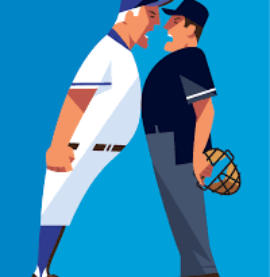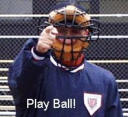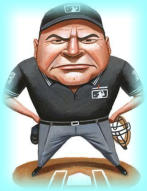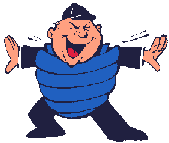© 2019

DEAR COACH
DEAR COACH
Baseball / Softball

Bat Hitting Ball Second Time
QUESTION: Ruling on bat hitting ball second time. Batter hits ball and drops
bat in fair territory and ball strikes bat second time. Is that dead ball b-r out?
Other runners can not advance?
ANSWER:
1. If the bat is out of the batter's hands, dropped or thrown, and it hits the
ball a second time in fair territory, the ball is dead and the batter runner is
out.
2. However, if the BALL hits the bat on the ground, the batter is not out and
the umpire must then determine whether the ball is fair or foul based on the
fair / foul rule.
3. If the ball rolls against the bat in fair territory, the ball remains live.
4. If the ball stops or is touched in fair territory, it is a fair ball.
5. If the ball touches the bat in fair territory and then rolls to foul ground and
stops, it is a foul ball.
6. If the ball rolls against the bat in foul territory, it is a foul ball.
RULE 6.05 A batter is out when -- (h) After hitting or bunting a fair ball, his bat
hits the ball a second time in fair territory. The ball is dead and no runners
may advance. If the batter-runner drops his bat and the ball rolls against the
bat in fair territory and, in the umpire's judgment, there was no intention to
interfere with the course of the ball, the ball is alive and in play;

SanFilippo:
Youth sports no longer about the kids
Anthony J. SanFilippo
Just finished coaching youth baseball for the summer, as has been the case
for the past six years. However, this year the coaching foray stretched into
late July and tournament baseball. It was a new experience from a coaching
perspective. Last year, it was just cheering from the bleachers as the local 11-
year old team reached the state tournament with my kid serving as a role
player. This year was different. It was eye-opening. And frankly, what was
witnessed was pretty darn embarrassing. First, let it be stated that
tournament team baseball has simply taken over in every suburban
community near and far. Whether it's Little League, Babe Ruth or the
younger arm of the Bambino known as Cal Ripken Baseball, everything is
geared toward the development of tournament teams. House leagues, which
mostly everyone who grew up prior to this era participated in, are not
important, except as cash cows for the athletic organizations that offer them
and often end the same week as school.
This means, for 90 percent of the ball-playing youths, America's pastime,
which is synonymous with summer, is over before the solstice even arrives.
That's a shame. But, in defense of the house league organizers, it's
somewhat understandable. Parents are more interested in going to the
shore or enrolling their children in summer camps than they are with
continuing baseball as an activity into the summer. With rosters being
smaller in number (to assure every kid playing time), the gamble of forfeiting
games because of other activities are too great to risk keeping these leagues
running very long past the final school bell. But what of the 30 or so kids in
each age group that really want to keep playing? There has to be something
for them, right? Well, that's where tournament ball comes into play. And
that's fine. There are now tournaments for kids as young as 8 and as old as
18. The premise of these tournaments is to allow the kids who want to
continue playing the chance to do so, which is definitely a positive.
So, each athletic association, whether it's the Brandywine Youth Club, or the
Ridley Athletic Association, or Drexel Hill Little League, or whoever, creates a
team of kids to play tourney ball, usually through some sort of tryout. If there
are enough kids left over, a second squad, or "B" team is formed. There are
plenty of tournaments for all to participate in, including the kids in the "B"
program. While this all sounds hunky-dory, it's really not. That's because
when it gets to this point, for the most part, the organizers, or coaches, or
both, and yes most of them are parents of kids on these teams, suddenly
take it too far. It becomes more about winning for community pride, and
making themselves look good - as if they are going to be hired by a major
league team at summer's end - than it is about teaching the kids to play the
game the right way.
At a recent "B" tournament, I was talking to an opposing coach during
warmups. He said that his organization held tryouts every year for the
tournament team for four years running, and every year, the same 12 kids
were chosen to be on the team, no matter how many kids tried out. "It's so
political in our town," the coach said. "As a parent, you're either part of the
in-crowd or you're not. It has nothing to do with your kid, it's all about who
the parents are, who they know, and what part they're willing to play." At the
same aforementioned tournament, while speaking to another coach, it was
divulged that one of the 10 participating coaches loaded his roster with 20
names, which is a lot for one team.
After nearly losing to a team he felt he should have obliterated, the coach
called on kids who played for that organization's "A squad." He was handing
out jerseys to these kids minutes before the next game. Suffice it to say, they
dominated. In my team's final game, while coaching first base, two of the
coaches from the opposing team were talking to my left. One pointed out a
kid sitting in the stands who played for their squad a season earlier. One
coach walked over to the kid and said, "What are you doing this weekend?"
"Nothing, why," the youth replied. "I could really use you for our semifinals
and finals," said the coach. "But, I'm too old, and I'm not on your roster," said
the dumbfounded child. "Don't worry," said the coach with a snicker. "I'll take
care of that." Unfortunately, this shouldn't surprise, because it happens far
too often. And not just in baseball, but in other sports too.
It's all about their shallow and fleeting individual glory, and not about the
kids themselves who are participating, and supposedly growing within the
game. As watchdogs, we in the media are quick to point out character flaws
and things like drug abuse and steroid use by players as a way of both
reporting news, but also sending a message to those impressionable in
society that this behavior is wrong.
But, what good is it when children are learning from their parents and
coaches that cheating is acceptable? Yet, nothing can be done. As long as the
competition remains more about the adults involved in youth sports than
the ones actually playing the games, it will remain this despicable, if not
worse.

Schiele's Slant: The umpire strikes back
You're blind as a bat! You stink! Get a clue!
Welcome to the world of being a Little League baseball umpire. It is a
thankless job. One where, while kids are having fun on the field, adults in the
stands sometimes are the ones acting like children. We've all seen it. Or
heard it. The loudmouth with the booming voice expressing his displeasure
over a call. The mom shrieking after her son got called out looking at strike
three. Heckling an umpire dates back to shortly after Abner Doubleday
penned the rules of the game. In most cases, the catcalls and cackles are
harmless banter.
Just a chance to poke fun at the men in blue. But after chatting with various
local Little League umpires, all agree there are times when parents go over
the line. Not often, mind you, but when the line is crossed, things sometimes
can turn ugly. "It doesn't happen a lot," said umpire Frank Giunta, a veteran
of seven-plus years behind the plate. "I'd say it's less than one percent. Most
of the time the parents act like they're supposed to. After the game they
thank you and appreciate what you do." The umpires admit they've missed
some call over the years. And they don't mind dealing with coaches and
managers over such matters.
But when the parents get involved, that's a different story. "I understand
people are competitive and they want their kids to do well," umpire Brian
Nardelli, a 10-year veteran, said. "That's why I try and ignore that stuff and
don't pay attention. To me, it's not about the parents. It's about the kids and I
try to keep it there. "Unfortunately, there's always one that causes a stir now
and then, it's rare, but it happens. I've seen fans get thrown out. I even saw
one get so mad he threw his lawn chair." Hey ump, we know you're blind,
we've seen your wife. You couldn't call a cab. LensCrafters called, your
glasses will be ready in 10 minutes.
Umpire Tim Sugalski, who has been calling games for about four years,
understands the heat-of-the-moment times when parents go off. But, he
said, they have to learn to let it go. "The crazy things is when they harp on
one close call," Sugalski said. "They never let it go the entire game, and after
it. "They think you are being unfair, but you're out here doing the best you
can. It's not like I'm being paid more by one team or the other. It's not like I
have a team I want to see win. I'm here to call the game and see the kids
have fun." Pat Allman, who has been umpiring games for 22 seasons, has
tossed out his fair share of fans over the years. He even gave the thumb to a
mascot once. Yes, a mascot. More on that later.
"When it comes to language, there is no warning," Allman said. "You hook
them right away. You know the words I mean. There's no place for that at all,
especially around kids. "If they are loud (but not cursing) and far away I'll
warn them. If they are close, like behind the backstop and act like a
commentator, commenting on everything, I'll usually wait to between
innings, get a drink of water and quietly tell them they can watch the game
from here or from the parking lot. The results are usually pretty good." Hey
ump, this cell phone must be yours. It has three missed calls. Wake up ump,
you're missing a great game. I've seen potatoes with better eyes. Giunta finds
it amazing that some of the biggest umpire baiters are people that have no
clue about the game. "It's mostly a lack of knowledge by parents who don't
know what they are talking out, he said. "They don't know the rules and they
voice their opinions without an education. "You would think parents would
set an example for the kids. The kids, sometimes you call them out, they
maybe make a face or something, then walk away. The parents, they just
continue to go on and on about it. It's funny, the parents sometimes act like
a child more than the kids do themselves." Allman said in most cases, the
parents that go over the edge are not one-time offenders.
"Usually, when a person is a troublemaker at a game, they don't save it for
just baseball. It's every sport, every year. The parents know who the bad
apples are. "There have been times I've warned people, or hooked people,
and when the game was over, a parent from that same team will come up to
me and will tell me they were glad I did that. That he's been doing it all year."
Hey Blue, did your glass eye fog up? Can I pet your seeing-eye dog after the
game? I thought only horses slept standing up. As for worst-case scenarios,
thankfully none of the umpires had physical altercations. One talked about
having his cellphone in hand, 9-1-1 dialed in and ready to hit send after his
car was surrounded by angry parents that eventually walked away. Another
told a story of an angry parent being physically restrained by other
bystanders as the ump sprinted to his car. The best of the bunch was about
an incensed parent, after a call at home to end the game, jumping over the
outfield fence and running to confront the ump at the plate. How did it end?
"He was arrested for public intoxication," the umpire said with a laugh. As for
the mascot ejection story, Allman explained it this way. He was living in the
state of Washington, calling a district playoff game where fans, parents and
mascots were not allowed to coach the kids during tournament games.
"The guy had been drinking," Allman said. "The mascot was a guy in a gorilla
suit. Hey, I drink, and I can tell he had been drinking, even if he's wearing a
gorilla suit. He kept coaching the kids, even after I told him to stop several
times. I told him, mascots are supposed to cheer, not coach. "He doesn't
stop, so finally I hook him. I ran the mascot. And by rule, he had to leave the
field. Next thing I know, I see him, still in his gorilla suit, head and all, driving
off down the road in an open Jeep. Meanwhile, I'm thinking to myself, I just
ran a gorilla." Back on a serious note, Allman has advice for parents. Having
seen thousands of games, he speaks from experience. "The parents are
supposed to be here to cheer," he said. "That's what I tell them, it's your job
to cheer, my job to umpire, the coach's job to coach and for the kids, it's their
job to play and have fun. It's as simple as that."

Bat Hitting Ball Second Time
About House Rules ....
Dear Coach,
This past season I had exactly six times on the diamond when the game
threatened to get out of hand. In each case an argument developed
between a manager, coach or fan that drew me in and required me to
enforce "house rules."
Worse, every report of game problems I received from a young umpire
involved a disruption over "house rules".... rules: not taught at any
umpire clinic, not developed at a meeting with the umpires present,
never posted or handed to an umpire, just yelled at them by parents
and coaches during a game.
Coach, I spend literally hundreds of hours each year reading and
studying the rules. I attend workshops, clinics and subscribe to three
publications designed to make me a better official. No where had I
encountered these "rules" that suddenly I was to ensure were not
violated.
Let's look at the situations:
Pitcher Rules
Rule One: The pitcher hit two batters in an inning and must be
replaced. This turned one of my most enjoyable games into a
nightmare. This rule is not in the book anywhere. It served to
emphasize this simple point, a point that will be reinforced throughout
this letter ... If the coach wishes to do this, they may. If the league
wishes to make this a policy guideline for its coaches, they may do that.
Is it a rule to be enforced, during a game, by the umpire? No!
Rule Two: The maximum innings a pitcher can pitch is two in the early
season, three later in the season. Again, this is coaching policy, an
agreement that the coach has with the league, and should not be an
enforceable rule by the umpires. Our rule book has well defined
pitching restrictions that do not need adjustment. I would like a dollar
for every time, after the first batter of the third inning had struck out, a
coach came up to me and said "That pitcher can't pitch this inning."
Now the game is delayed and it is coach against coach, and this then
becomes parents against the umpires. The umpires will call the rule
book, everything else is a simple agreement and not binding on the
umpires.
In this specific situation what happened was a prime example of how
these rules affect the game: Coach1: "It's two innings." Coach2: "It's
three innings." Coach1: "It's two ...." Round and round, while the umpire
watches and the fans yell.
If the coach feels that one of the league's guidelines has been broken
he can phone the league administrators after the game, and they can
investigate and impose sanctions as deemed necessary. Coaching
guidelines and policy, outside the scope of the rule book, should not
occupy the umpire's or player's time on the diamond.
Rule Three: Balks will not be called till mid-season If you are an umpire
then you would appreciate the results of this one. The intent is
instruction: the results anything but. The pitcher are literally given
carte blanche to go for anything early in the season. If the pick off a
runner you have a coach or parent yelling that you missed a balk. Since
there is no penalty you often have balk after balk, delay after delay,
argument after argument. Why? Simply, because pitchers have not
been coached properly on pitching technique right from the early
leagues. Because there are few, if any, pre-season practices to do this
in, the game becomes the practice, the time for learning skills instead
of applying skills. So, the umpire becomes the instructor and does the
coach's work at the expense of getting the game underway.
In this case let the rule stand on its own. The pitcher who does not
pause will have the balk called and the runner will advance. Will he fail
to pause again? Not likely. Do your coaching and instruction in
practices and the corrections required during the game will be minimal.
Policy or a rule? A guideline for players and coaches or something that
bears equal status with balls, strikes, safe and outs?
The "Must-Slide" Rule
The intent of this "rule," hidden behind safety concerns, is really that
kids are not sliding into bases when a play is happening. What this has
done however is cause untold arguments over "she didn't slide, she's
out!" The fact that players do not slide, or do not slide properly, is a
coaching issue, to be corrected at practice, not a rules issue to be
enforced by an umpire.
It has created a far worse scenario: With a runner on first, the batter
hits a clean double but because the fielder is at second the runner
slides in. What do you call here? The player has been taught that they
must slide into a base anytime a fielder is present. The umpire would
now have to call obstruction, and that will lead to bigger arguments.
Does the league not have a comprehensive, well written rule in place
already? Why complicate it? Let the umpire interpret and enforce the
existing rule. If it is a policy of the league that the players should slide
at every base, that is policy, leave the interpretation of the book rule to
the training the umpire receives.
No Infield Fly
It had to happen though: Bases loaded, the ball goes up and lands next
to second base uncaught. The fielder tags your runner and then steps
on the bag, double play, the third out. Who got yelled at?
Your fastest runners on first and second, the ball goes up and hits your
runner who is standing on the bag. What is the call? The runner was out
for interference is all the umpire has left. The protest that followed:
"The runner is protected during the infield fly, so they should be
protected even though the rule is not called."
The reason given for the rule modification: "the fielders might not catch
the ball" and "that is the farthest some of the players would ever hit"
may be true, but the rule remains the rule. The real reason for the
house rule, in my personal opinion, is to avoid a game and coaching
situation that has not been taught to the players.
The Helmet and Chin-Strap Rule
Three times this year I was demanded to call a runner out because their
chin strap was unbuckled at some point around the diamond. Three
times I refused and simply asked the player to refasten the strap. In all
three cases there was not even a play taking place. Coming down the
baseline after hitting a homerun and unclipping a helmet strap is not a
reason to call the runner out.
The rules of baseball concerning helmets and what happens when a
helmet is removed accidentally or intentionally are specific. "House
rules" which focus an umpire on details such as a chin strap, instead of
the play at the base, are putting the emphasis away from the game and
on to technicalities. They serve to breed contempt and arguments such
as the one that happened above.
In my personal opinion, if the league cites as precedent rules that say
"all runners must be wearing a helmet" as the basis for their local
"automatic out" safety rule, then the same rule book wording also
applies to the wearing of the catcher's helmet, found in the rule right
above that one. If the catcher removes the helmet and face mask which
they must wear, then the runner must be equally "automatically safe"
on any play at the plate.
The argument becomes circular and quite heated. It is fueled by the
well meant intentions of a house rule that becomes applied at times it
was never meant to.
The No-Bat Rule
Even though several levels of the league have eliminated the on-deck
circle, there is no "automatic out" for a player holding a bat in his hand
in the dugout. The situation was a classic: Coach: "Time ... (time) ... the
batter is out because a player in the dugout has a bat in his hands."
Umpire: "Where did you find that rule." Coach: "That's the way the
game is played, Blue." Umpire: "Wrong game, Coach."
Now the umpire is expected to control the players in the dugouts! If you
go behind the plate and put my mask on, you discover you cannot see
the dugouts unless you turn your head away from the ball, away from
the pitcher, away from the play. One umpire, eighty or more feet away
is expected to have control over a situation three coaches, less than six
feet away, miss.
Swinging a bat in the dugout is dangerous and I will ask the players not
to do this. In every case they have complied. Holding a bat in the
dugout? This is a house rule that, although perhaps well intended, took
the responsibility away from the coach and placed it on the umpire.
Calling the "rule" will lead to ill feelings around the ball park.
By the way, the conversation quoted above took place, not on a
Tuesday evening, but on a Saturday morning in tournament play. Here
we have the biggest side effect of house rules: a local policy coming into
competitive levels of the game.
The Five-Run-Per-Inning Mercy Rule
Here is a rule that, in principle, I can support, except that it has been
complicated by several issues. Let's look at the results:
First, the interpretation of the "five" runs varies. Some believe that you
can actually score eight runs if the batter hit a home run with the bases
loaded. The result has been a "fifth run" situation is which the coaches
are running everybody home until a third out is made. The results are
simply a travesty and moments when the diamond goes out of control.
So, five runs is five runs, no more.
Next, when the league says "open final inning" I interpret that to mean
the last inning of a regulation game, in this case, the sixth. That is not
how it is being interpreted by the coaches however. Our younger games
are played with strict time limits: no inning may start at one hour and
forty minutes, no game continue beyond two hours. We are completing
the third inning nearly eighty minutes into the game. Despite what
common sense and my watch are telling me, the next inning is not the
"open" inning. Here is why: if I declare it the open inning then it is also
the final inning. If you get three up, three down then the game is over,
and we have not reached the time limits.
Randomly declaring an inning as "open" has resulted in terrible games
in which the visiting team has stayed at bat for over 40 minutes while
the home team tries to make one out. It has also led to more bad
feelings and arguments amongst coaches and parents about which
inning should be open, or whether this is the open inning. etc. etc.
Finally, when we do reach the two hour time limit (which happens in
the top of the fourth inning that has been declared open) having the
umpire declare "Last Batter" has also had mixed results. Now we have
all the runners in motion as we attempt to squeeze every run over the
plate that is possible. This is then followed by "words" among the
coaches, parents and ultimately the umpire who gets dragged into the
conversations.
The solution to this one is simple, the umpire simply declares: "That's
the game" after a batter has completed a time at bat. Game over.
In summary: if we wish a five-run-mercy-rule then it is exactly that. Five
runs maximum per inning, no open innings, no declarations of last
batter.
Open Substitution and Everyone Bats
In house leagues I have long felt this to be a good equalizer, getting
everyone on the field and to the plate. I understood how it was
intended to expand the participation and remove some of the
competitiveness. In our youngest divisions it has succeeded well, but
this rule has had a darker side when we move into what are our
competitive teams and ages.
What we regularly witness is a computer printout of whose turn it is to
play second base this inning, to pitch in the third inning etc. etc. The
printout often has the positions for the next month included and is
followed regardless of the game situation. If the coach can't make a
game, the players simply follow the sheet while any parent sits in the
dugout. The role of the coach, and the development of position players,
seems to be minimized. An "everyone does everything" mentality has
led to no one done anything particularly well. Games drag on, pitch
after pitch, passed ball after passed ball, error after error.
It has lead to one new complaint made to both the umpires, the
coaches and the conveners: "It's my turn!" This is now heard from
parents and players. In one case an umpire was told he could not start
the last inning of a game because a player had only played in the
outfield that game. It was the player's "turn" to be on the infield, it was
the player's turn to catch, to pitch, to play first base. Bringing
resolution to this is not a simple process.
There is also a downfall to this rule when the tournament team is
selected and starts playing. Many, many coaches have no idea on how
to manage substitutions and re-entry, or how to work through their
lineups. Most players lack the unique skills needed to be a "position
player"
Personally, my observation is that this rule has weakened the local
level of play since it was put in place. As umpires we no longer see
players who have quality skills at several positions around the
diamond. We see a different catcher each inning, many who cannot
handle the position. Have you ever stood behind a young catcher, who
has put the equipment on for the first time, ever? You realize this just
about the time you take the second shot off your collarbone on a high
uncaught pitch. The desire to expand participation, remove some of the
competitive edge, and simplify the coach's job has, at the higher levels,
had the effect of deteriorating the level of play.
In Conclusion
If you wish to have "house rules" then they must thoroughly address
rules that are in the rule book and not be a league policy statement for
its coaches. The reason for the rule change should stated the rule that
is being replaced and the intent for the replacement.
The results of house rules, from the umpire's perspective, are often
detrimental to the game. They result in arguments with coaches and
parents that are not really part of baseball, but part of the trappings
that surround a skewed interpretation of the game.
Next season, as the leagues form, I encourage you to revisit your
"house rules," include an umpire in the discussions of these rules and
the impact they will have on the game. Separate your "rules" from your
"policy" and monitor policy at the league level, not during the game.
Finally, if you have any real rules left, I encourage you to have copies of
these rules distributed to the umpires and posted on the bulletin
boards for all to see.
Let the umpires study and learn the rules of baseball as it is to be
applied at this level. That is difficult enough without having artificial
situations flare up as they have so often on our diamonds these past
few seasons. The results have not been really fair to anyone let alone
those who volunteer their time to officiate games for young players.
Still calling them as I see them,
THE UMPIRE
... written August 9, 1999

Poise - A Life's Lesson
As a member of the board of directors of our town's youth baseball
program I am often asked for advice by new coaches and managers when
they enter our league. One of the most common questions is "There is so
much to teach…what skills are the most important? What should I teach
first?" Without hesitation my response to that query is one word: "poise."
Expecting to hear something more like base-running, bunting, or sliding, I
often will get a surprised look and then the follow up question, "What do
you mean poise?"
This is what I mean:
Poise means composure, the ability to maintain a good attitude and not
let the disappointments of the game drive one's behavior. Keeping your
cool. In a game where even the best players are unsuccessful two out
three trips to the plate, keeping one's poise can get you through the day.
Since many managers see their players' failures as their own, the
manager must make poise his number one behavior trait as well. Poise is
the example you have to set for your players to emulate. Sometimes the
disappointments of the game are connected to the rulings of the umpire.
So let's go there for minute.
If you've ever thought, "That umpire cost us the game." You're fooling
yourself. What about your players that got put out during the game? At
least 18 batters or runners had to make an out during every game!
Perhaps some of those outs could have been hits that might have scored
more runs? Maybe some of those outs cost your team the game. If an
umpire's call was, in your judgment, incorrect and it benefited the other
side, chances are good that the same umpire made other incorrect calls
during the game or the season that benefited your side too. If you're
going to complain about bad calls that go against your team, are you
prepared to go out and propose that a bad call that helps your team be
reversed as well? I don't think so. So, in effect, complaining about a call
you don't agree with is hypocritical. If you're going to silently accept the
benefits of an incorrect call that favors your side, you have to accept the
questionable calls that hurt your team with as much calm composure and
nary a protest.
What you have to recognize is that any amateur umpire is very much like
yourself. He's out there because he loves the game and wants to do his
part to help kids have fun playing it. Fairly and by the rules. Like you, he's
not an expert and he's not a professional. He doing his best and he has no
desire to favor either side. He only wants to make the best ruling he can
at the time he sees the play. His decisions are final. So why argue them?
Why would one deliberately to be rude and disrespectful to the one
person one the field your team really needs support from? The umpire is a
human being just like you and the more abuse that is directed at him, the
more distracted he will become. You know it's hard to think clearly when
you're the target of harangues from players, coaches or spectators.
Allowing this situation will unfortunately cause the distracted umpire to
become even more likely miss another play or mistake another ruling.
Your objective as coach is simply to win the game, which usually includes
some playing and mental errors. But you can still win despite those
errors. Remember, the umpire's objective is to go out there and get every
play right. No errors! When an umpire makes a bad call he usually knows
it and feels just as bad about it as you do. If you lose your poise and blast
the umpire for a call you don't like, think: are you making the umpire the
scapegoat for your strategy failures, or your team's failures? If that's the
case, you fail as a coach and you're making it harder for the umpire to do
his job well. Help your players to learn to play better instead making
excuses for their poor play by blaming the umpire.
No doubt a bad call will cost you an occasional run, or hand your team an
undeserved out. However, one of the most important lessons you can
teach your player's is that you'll never agree with every call the umpire
makes. Baseball is officiated by humans who are not perfect. It has always
been like that and it always will be. Learning to live with an occasional
bad call is as much a part of learning to play this game as learning to hit
the ball. The sooner your players accept that, the more successful players
they'll be. Have you ever seen a player or manager just completely lose
control and end up getting ejected over what was a bad call? It happens.
Part of being successful is the ability to keep your poise and stay in the
game, literally!
I have seen innings where a defense had given away five or six outs to the
other team by their poor play: dropping balls, making wild throws and
committing mental errors. Then when a close "banger" at first base
doesn't go his team's way, the coach hollers, "Get in the game, Blue!"
I continually notice that the most successful players never react to an
umpire's decision that goes against them. They always maintain their
poise. No matter how incorrect an umpire's decision seems at the time,
they calmly dust themselves off and get back in the game without
comment or complaint. These successful players know that this time it
didn't go their way. However, next time it might, and sooner or later it
will. They know the law of averages will keep it fair and things will
eventually even out. Successful players know that as long as they keep
their poise they're going to continue to enjoy the game.
We often hear that participation in youth sports is a valuable experience
that helps prepare children for the competitions and conflicts of life. As a
coach participating in this valuable experience what could be a more
important life's lesson than teaching poise? Probably none of your players
will ever advance to become a professional baseball player. As a working
adult, it's been a long time since I was told to get my mitt and go in to
cover first base, or to get a bat and try to bunt the runners up a base.
However, as adults we all deal with adverse and difficult decisions made
by others that effect us every day. From the assignments that our bosses
hand us to the traffic ticket the policeman hands us. Learning how to
handle those disappointments in a mature and dignified manner is the
same lesson you as a baseball coach can teach right now!
Keep your poise

T.RICOUNTY U.MPIRE G.ROUP
has adopted a NO TOLERANCE POLICY
regarding abuse of umpires.
SPECTATORS: The umpires should not speak to abusive spectators - the
umpire will notify the manager and the policy will be enforced as follows:
1: The first warning will be given to the offending team's manager.
2: The second warning will be given to the offending team's manager.
3: If a third warning must be issued, the offending team will forfeit the
game.
NOTE: The following rule applies to Little League Only!
9.01 (f) Umpires may order both teams into their dugouts and suspend
play until such time as League Officials deal with unruly spectators.
Failure of League Officials to adequately handle an unruly spectator can
result in the game remaining suspended until a later date.
ON-FIELD PERSONNEL: The above policy does not imply that players,
coaches and managers must be warned before ejection from a game. The
following offenses may result in immediate ejection from the game:
1: Profanity or obscene language.
2: Physical or verbal assault on an umpire.
3: Throwing hats or other equipment on the field.
4: Arguing balls and strikes or other judgment calls.
The umpire will handle individual situations with on-field personnel, as he
feels necessary. He may warn a coach or manager or send him to the
bench as alternatives to ejection from the game. These decisions are like
all other judgment calls - they cannot be protested and will not be
changed.
If a player, coach or manager is ejected from the game, he will be required
to leave the area immediately.
Managers and Coaches: Please keep your players and spectators under
control. Be respectful of the umpires - they are human, just like everyone
else on the field. If you have a question about a ruling, ask the umpire for
time and then discuss the situation. Remember that judgment calls
cannot be protested and will not be changed.
Remember that our goals are to teach our players sportsmanship and
control of their emotions on the field. Teaching by example is the best
method to instill these qualities in our players.
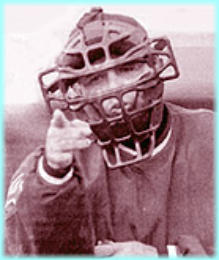
Please contact the UMPIRE-IN-CHIEF if you think that an umpire
has made an incorrect ruling or is doing a poor job on the field.

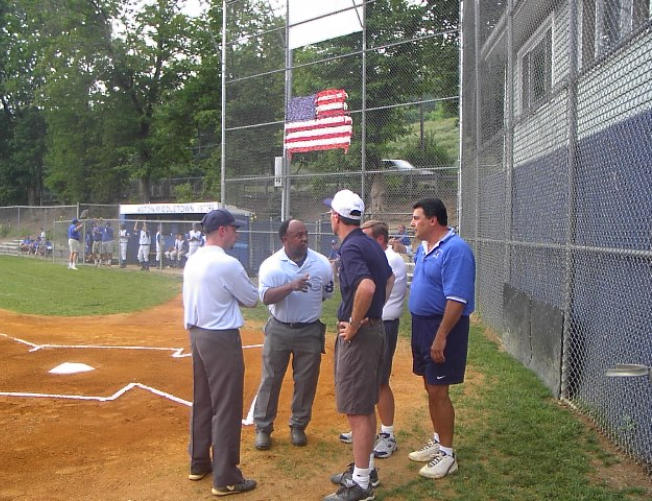
GROUND RULES DISCUSSION
When does an official game of baseball start?
Once the coaches and the umpires agree
to the ground rules, and shake hands,
the game of baseball is official and can start.
